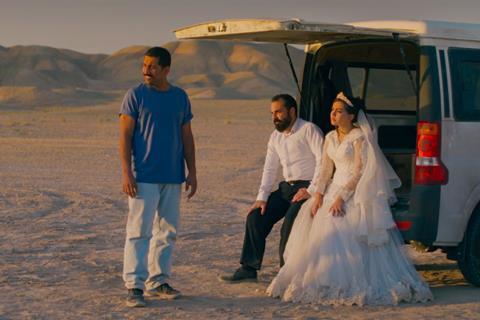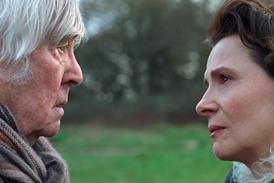Cannes Competition title sees a traffic accident spark a series of devastating events

Dir/scr: Jafar Panahi. Iran/France/Luxembourg. 2025. 103mins
A man (Ebrahim Azizi), his heavily pregnant wife (Afssaneh Najmabadi) and their young daughter (Delmaz Najafi) are driving late at night on the outskirts of Tehran when they collide with and kill a stray dog. The car engine falters and they seek help from a local business owner. There, they encounter Vahid (Vahid Mobasseri), who recognises the husband as the man who ruined his life – or, at least, he thinks he does – and a spiralling chain of events is set in motion. For his latest film, Jafar Panahi drew inspiration from the stories of the fellow inmates he met during his seven-month-long second stint in prison. There’s a seam of pitch black gallows humour running through the picture, and moments of absurdist hilarity. But mostly, it’s an impassioned and forthright condemnation of the regime and of the men who do its bidding.
An impassioned and forthright condemnation of the regime and of the men who do its bidding.
The sentence, handed out after Panahi’s first arrest in 2010, banning him from making films, giving interviews and travelling, resulted in the more introspective and experimental approach of pictures such as No Bears and This Is Not A Film. Now that the sentence has been officially annulled, Panahi looks outwards once again and discovers an Iran that has changed markedly from that of his earlier pictures. This Cannes Competition title is still, however, clearly a work that was created outside of the official system, without approval from the authorities.
It’s a brave picture that confronts injustice head-on and which gives voices to a group of characters (fictional, but drawn from the experiences of real people) who found themselves victims of the regime. Panahi has picked up an impressive haul of prizes over the years, including Berlin Golden Bears for The Circle and Taxi Tehran; Cannes Best Screenplay for 3 Faces and a Special Jury Prize at Venice for No Bears. It Was Just An Accident may well follow a similar path.
It’s not the man’s face that prompts a sickening lurch of recognition in Vahid. Rather, it’s a sound: the tortured creak of a prosthetic limb – also used to brilliant effect in a paralysingly tense sequence towards the end of the picture. Without a clear plan, Vahid abducts the man from a busy city street. He believes that the man is a former regime enforcer and prison interrogator nicknamed Pegleg but, to be certain of his identity, he calls upon others who bear the scars of Pegleg’s brutal treatment.
They are a disparate group. Panahi stresses that people from all walks of life have found themselves imprisoned and punished by the regime. And while they are united by the traumas that they endured, they may agree on little else – certainly not about what to do with the man who may or may not be their torturer. While Vahid found himself behind bars for asking for his outstanding pay, wedding photographer Shiva (Mariam Afshari) was imprisoned for criticising the regime. Goli (Hadis Pakbaten), a bride-to-be in a full meringue dress, is deeply traumatised by her experiences at the hands of Pegleg; her groom (Majid Panahi) is just beginning to comprehend the extent of her suffering. Hamid (Mohamad Ali Elyasmehr) is a man driven by an ungovernable anger that causes him to lash out indiscriminately. Meanwhile Salar, an older man whom Vahid tracks down in a bookshop and who refuses to get involved, cautions reason and restraint.
Panahi squeezes these warring elements with their conflicting opinions into the back of a white van. Like the frame itself, the van is a claustrophobic space that seems too constrained to accommodate the accumulated pain of Pegleg’s victims. Meanwhile, just existing comes at a cost, with every security guard, nurse or petrol station attendant demanding a ‘donation’. As a film that is all about giving voice to the oppressed and allowing the people to speak truth to power, it can be a little declamatory. But the picture’s most emphatic message – a demand for remorse rather than revenge – is one which bears repeating.
Production company: Les Films Pelleas , Jafar Panahi Productions
International sales: MK2 Films shanna.segond@mk2.com
Producers: Jafar Panahi, Philippe Martin
Cinematography: Amin Jafari
Editing: Amir Etminan
Production design: Leila Naghdi
Main cast: Vahid Mobasseri, Mariam Afshari, Ebrahim Azizi, Hadis Pakbaten, Majid Panahi, Mohamad Ali Elyasmehr
























